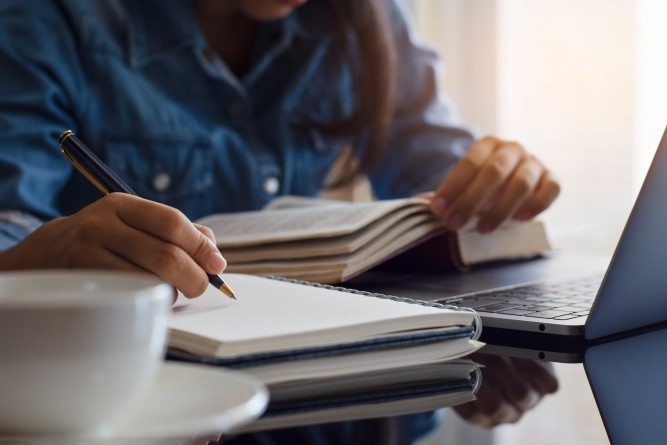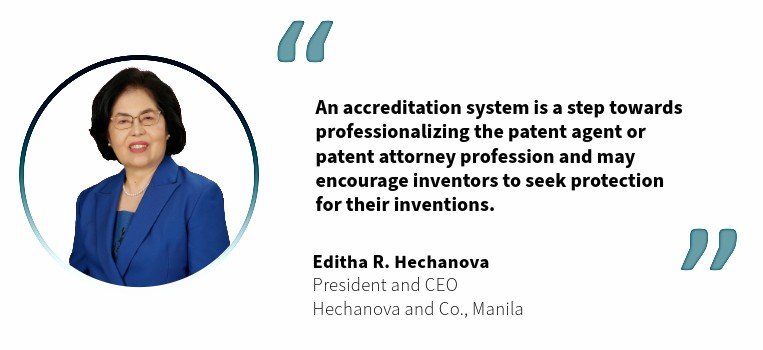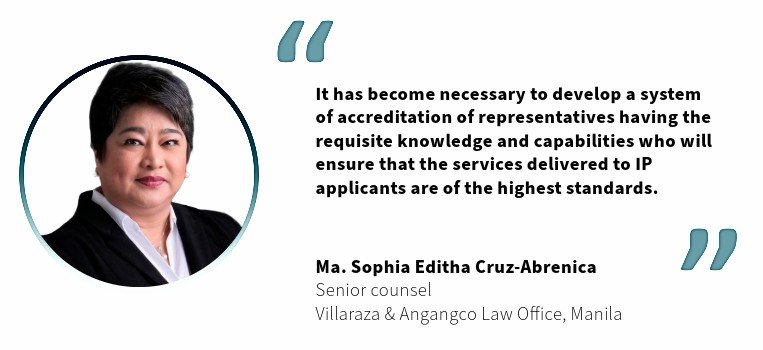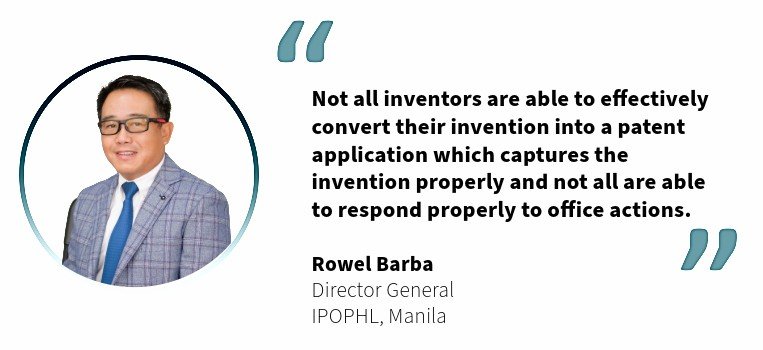The professionalization of trademark and patent agents in the Philippines
11 September 2024

With the wave of changes in the Philippine trademark and patent systems, Espie Angelica A. de Leon discusses the importance of an accreditation system for trademark and patent agents, including its benefits, among others.
Important changes are about to unfold in the trademark and patent scene in the Philippines. These changes will revolutionize the way intellectual property professionals conduct their work, setting standards that should have been in place a long time ago and ensuring consistency in the country’s trademark and patent systems.
Setting off this wave of changes is a much-needed accreditation system for trademark and patent agents and lawyers. This system is designed to provide applicants with official names of people who have adequate knowledge and are well-trained, skilled and trusted in their fields of expertise.
The accreditation system, which is mandatory for non-lawyers, was finalized via the Intellectual Property Office of the Philippines’ (IPOPHL) Memorandum Circular Nos. 2024-012 and 2024-013. The circulars were published in the Daily Tribune on August 6, 2024, and went into force on August 22, 2024.
According to its rules, trademark and patent agents and lawyers are required to undergo and complete training, pass a qualifying examination and submit certain documents, among other requirements. The guidelines enumerate the grounds for the revocation, cancellation and renewal of accreditation which is valid for three years.
“With the government pushing through the Philippines Innovation Act or RA 11953 and other related laws, including increasing budget allocation for research and development (R&D), there is hope of finally establishing the patent agent or patent attorney profession,” said Editha R. Hechanova, president and CEO of Hechanova and Co. and managing partner of Hechanova, Bugay, Vilchez & Andaya-Racadio in Manila.

The trademark and patent agent
First, what are the responsibilities of trademark and patent agents?
A trademark agent acts on behalf of the trademark owner, who is the principal. A trademark agent’s responsibilities include conducting trademark searches to ensure the mark is registrable or that the risk of infringing other marks is low; ensuring the goods and/or services intended for the mark’s use are properly classified under the Nice classification; preparing, filing and processing a trademark application; promptly submitting the power of attorney and informing the principal of any office actions issued by the trademark examiner, such as citations of confusingly similar marks, requests for disclaimers, etc.; and using online trademark tools and others resources.
Meanwhile, a patent agent performs all duties and responsibilities in connection to invention patents, utility models and industrial designs. A utility model, as defined by IPOPHIL, is a protection option for innovations that don’t meet the inventive threshold required for standard patent applications due to their lack of inventiveness. The protection for a utility model lasts seven years. A patent agent’s responsibilities include conducting patent searches, drafting and filing patent applications, informing clients of office actions and responding to these, and taking note of deadlines, such as those involving requests for substantive examination for patents, annuity payments, renewals for industrial designs and other activities related to prosecution.
The problem in the absence of accreditation
The necessity of mounting a framework for accreditation was borne out of a problem that has festered in the Philippines. For many years, anybody, including non-lawyers, has been able to peddle his or her services as a trademark agent and file a trademark application for a client.
The IPOPHL accepts these applications as long as the agents submit a power of attorney or any such authorization document. “This has, in some way, brought down not only the professional fees but the quality of trademark applications being filed,” said Hechanova.
Then came a point when new trademark applicants started asking IPOPHL for recommendations of reputable and accredited agents whom they could tap to handle their applications. IPOPHL is not allowed to make such recommendations. To begin with, there was no record or listing of accredited trademark agents in the Philippines.
Compounding this was the entry of foreign firms onto Philippine soil to set up shop and deliver IP services. The Philippines’ practice of law is regulated by the Supreme Court and only lawyers can practice in the country. However, these foreign firms arrived, incorporated and then provided IP services, circumventing the law.
Under the patent law, inventors can personally file a patent application for their own inventions. “[But], not all inventors are able to effectively convert their invention into a patent application which captures the invention properly and not all are able to respond properly to office actions,” said Rowell Barba, director general of the Intellectual Property Office of the Philippines (IPOPHL).
Hechanova dug deeper into the problem. She revealed that about 90 percent of invention patent applications filed in the Philippines are from outside the country and mainly through the Patent Cooperation Treaty. In terms of utility models, about 98 percent of the total number of applications are from the Philippines, coming mostly from state universities and government research institutions. “The somewhat dearth in inventions makes it a challenge for patent agents or patent attorneys to devote their time in practising said patent agency profession full time,” Hechanova pointed out, “so they also handle trademarks.”
But then, the IP landscape is fast changing, dictated by the evolution of technology and shifting lifestyles, where people are consuming more and more tech-based services. As such, IP is now a highly complex field. The patent system involves highly technical components, not just with regard to specific subject matter dealt with but also in terms of laws, rules and regulations. “Because of this complexity, it has become necessary to develop a system of accreditation of representatives having the requisite knowledge and capabilities who will ensure that the services delivered to the IP applicants and holders are of the highest standards as to provide them optimal protection and benefit,” said Ma. Sophia Editha Cruz-Abrenica, senior counsel at Villaraza & Angangco in Manila.
The Revised Implementing Rules and Regulations for Patents, Utility Models and Designs of 2022 highlights such need. Rule 421 states: “An applicant or an assignee of the entire interest may prosecute his own case, but he is advised, unless familiar with such matters, to employ a competent attorney-at-law or patent agent, as the value of patents depends largely on the skilful preparation of the description and claims.”
Cruz-Abrenica explained further: “Claims amendment rules such that there should be no matters in the amendments outside the scope of the specifications as filed require circumspect drafting of the description and claims from the start. Skilful drafting of the claims is necessary to avoid clarity objections and undue extension of the patent prosecution process. Knowledge of the rules on patentability and exclusions thereto allows the applicant to avoid the filing of unnecessary and unpatentable claims which cost additional excess claims fees, only to be weeded out in the end.”
Ultimately, it’s the applicant’s resources that are wasted due to incompetent representation. This situation becomes even worse for micro, small and medium enterprises (MSMEs), many of which have limited resources to begin with.

Benefits of having an accreditation system
“An accreditation system would give some assurance to the patent holders and the public, in general, that the names indicated in the IPOPHL list have the necessary qualifications and skills to provide the desired service,” said Hechanova. “It is a step towards professionalizing the patent agent or patent attorney profession and may encourage inventors to seek protection for their inventions knowing that the persons accredited by IPOPHL have the experience and have undergone the necessary training and skills updating that IPOPHL provides.”
Establishing strict professional standards is especially beneficial to MSMEs. “They are often the most vulnerable to malpractice and misrepresentation in the IP application process,” said Barba.
“It will also help the IPOPHL to process applications more effectively and efficiently if the said applications are well-crafted with the help of agents who are knowledgeable in the relevant laws and rules,“ Cruz-Abrenica pointed out.
The accreditation or recognition system also helps lay out sound legal and technical foundations for the enforcement of patents and trademarks. This will further strengthen the IPR regime in the Philippines.
Plus, as the system develops a pool of skilled IP professionals, it ultimately contributes to the country’s general expertise and capacity to handle complex and timely IP challenges.
These benefits, of course, have economic repercussions as the introduction of the recognition system aligns with the Philippines’s thrust for a more innovative and competitive economy. Barba explained: “By facilitating easier access to patent or trademark applications, the recognition system encourages investment, entrepreneurship and technological advancement, contributing to the overall economic development of the country. The country stands to gain greater credibility in the global IP landscape, attracting foreign investors and businesses to seek patent protection in the Philippines.”

Trademark and patent agent accreditation in Asia
Japan, China, South Korea, Singapore, India, Thailand and Malaysia also have established accreditation systems for patent and trademark agents, founded with the same goals and objectives.
In Singapore, only registered patent agents with a practising certificate and who are Singapore Patent Agent Qualifying Examination passers can practice as patent agents and be called as such. Lawyers with practising certificates may also do patent agency work, but they are not allowed to describe themselves as patent agents.
There’s also a Patent Agent Examination that one must pass in Malaysia. The agent must also be registered with the MyIPO.
In Indonesia, the agent must secure a licence from the Ministry of Law and Human Rights as an IP attorney, also called an IP consultant. “The DGIP works with several universities to conduct education programs and a state exam is given at the end,” shared Hechanova.
“Interestingly, these countries have more developed IP regimes and significantly larger economies than the Philippines, which has allowed them to establish well-structured and long-standing accreditation systems for patent and trademark agents. These systems, supported by mature legal frameworks and robust IP infrastructures, have played a critical role in giving them a head start in driving innovation in their respective countries,” said Barba.
IP Academy is now offering the required training programs for Filipino trademark and patent agents and attorneys in order to be accredited.
IPOPHL’s accreditation system is certainly a significant development in the Philippines. With this, applicants expect nothing less than expert-driven service, higher quality patent and trademark applications and more timely, positive outcomes – all in the face of evolving technologies and a fast changing IP landscape. At the end of the day, all these will certainly transform the Philippine IP scene into one that is thriving and progressive and turn its economy into one that is more innovative and competitive.






